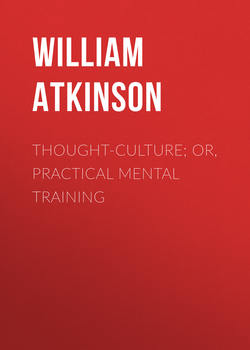Thought-Culture; Or, Practical Mental Training

Реклама. ООО «ЛитРес», ИНН: 7719571260.
Оглавление
Atkinson William Walker. Thought-Culture; Or, Practical Mental Training
CHAPTER I. THE POWER OF THOUGHT
CHAPTER II. THE NATURE OF THOUGHT
CHAPTER III. PHASES OF THOUGHT
CHAPTER IV. THOUGHT-CULTURE
CHAPTER V. ATTENTION
CHAPTER VI. PERCEPTION
CHAPTER VII. REPRESENTATION
CHAPTER VIII. ABSTRACTION
CHAPTER IX. ASSOCIATION OF IDEAS
CHAPTER X. GENERALIZATION
CHAPTER XI. JUDGMENT
CHAPTER XII. DERIVED JUDGMENTS
CHAPTER XIII. REASONING
CHAPTER XIV. CONSTRUCTIVE IMAGINATION
Отрывок из книги
It was formerly considered necessary for all books on the subject of thought to begin by a recital of the metaphysical conceptions regarding the nature and "thingness" of Mind. The student was led through many pages and endless speculation regarding the metaphysical theories regarding the origin and inner nature of Mind which, so far from establishing a fixed and definite explanation in his mind, rather tended toward confusing him and giving him the idea that psychology was of necessity a speculative science lacking the firm practical basis possessed by other branches of science. In the end, in the words of old Omar, he "came out the door through which he went."
But this tendency has been overcome of late years, and writers on the subject pass by all metaphysical conceptions regarding the nature of Mind, and usually begin by plunging at once into the real business of psychology – the business of the practical study of the mechanism and activities of the mind itself. As some writer has said, psychology has no more concern with the solution of the eternal riddle of "What is Mind?" than physics with the twin-riddle of "What is Matter?" Both riddles, and their answers, belong to entirely different branches and fields of thought than those concerned with their laws of operation and principles of activity. As Halleck says: "Psychology studies the phenomena of mind, just as physics investigates those of matter." And, likewise, just as the science of physics holds true in spite of the varying and changing conceptions regarding the nature of matter, so does the science of psychology hold true in spite of the varying and changing conceptions regarding the nature of Mind.
.....
Many psychologists classify the activities of the mind into three general divisions; viz., (1) Thinking; (2) Willing; (3) Feeling. These divisions, which result from what is known as "the tri-logical classification," were first distinctly enunciated by Upham although Kant had intimated it very plainly. For many years before the favored division was but two-fold the line of division being between the cognitive, or knowing, activities, and the conative, or acting, activities, generally known as the Understanding and the Will, respectively. It took a long time before the authorities would formally recognize the great field of the Feelings as forming a class by themselves and ranking with the Understanding and the Will. There are certain sub-divisions and shadings, which we shall notice as we proceed, some of which are more or less complex, and which seem to shade into others. The student is cautioned against conceiving of the mind as a thing having several compartments or distinct divisions. The classification does not indicate this and is only intended as a convenience in analyzing and studying the mental activities and operations. The "I" which feels, thinks and acts is the same – one entity.
As Brooks well says: "The mind is a self-conscious activity and not a mere passivity; it is a centre of spiritual forces, all resting in the background of the ego. As a centre of forces, it stands related to the forces of the material and spiritual universe and is acted upon through its susceptibilities by those forces. As a spiritual activity, it takes the impressions derived from those forces, works them up into the organic growth of itself, converts them into conscious knowledge and uses these products as means to set other forces into activity and produce new results. Standing above nature and superior to its surroundings, it nevertheless feeds upon nature, as we may say, and transforms material influences into spiritual facts akin to its own nature. Related to the natural world and apparently originating from it, it yet rises above this natural world and, with the crown of freedom upon its brow, rules the natural obedient to its will."
.....